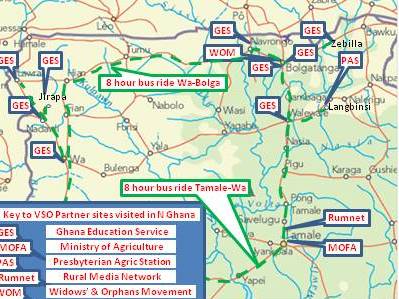This is a very functional entry, for the benefit of anyone else wanting a criminal record check in Ghana, e.g. to cover time volunteering in Ghana when seeking a CRB (Criminal Records Bureau) certificate in UK on return. If that's not you, please skip this.
Who knows whether it would be the same for you - but this was our experience:
1. Go to Police Headquarters (CID), near Danquah Circle in Accra
2. Ask where to go - told room 22 on second floor.
3. In room 22. told to go to room 5 on ground floor
4. In Room 5, told to go to end room on ground floor.
5. Shown into very crowded end-room where most of the rest of the action happens
6. After being in wrong queue, discover we need to fill in a form first. Get 2 copies of form from man in corner desk and complete them. Interpret codes, e.g. "ED" = Expiry Date on passport.
7. Pay cashier - for each of us it's 5 cedi plus 15 cedis. I think the 5 cedi fingerprinting charge was going to be 200 cedis if we did not have Ghanain residence permit - so show passports. Wait while cashier processes various payments, then get our change and passports back.
8. Supply forms to finger-printing man.
9. Queue up to get photo taken in next door room. Unclear whether this is next thing to do, but was probably a good thing to do next, because photo printing takes a long time after the photos are taken.
Queue is very uncertain for this, various pushing past, but eventually have photos taken.
10, Queue up for finger-printing. Queuing is perhaps unnecessary because the finger-printing man is working through forms in order, but you never know..
11. Get finger-printed. Wash hands.
12. Wait outside photo room (still in end-room) for photos to be printed. Again, much doubt re queue-jumping (and since people waiting for forms, for payment, for finger-printing, for photographing, or for photo-printing are all in the same small room, the 'queues' or scrums are all overlapping).
13 Wait more. Get involved in discussions re why people are pushing past others. Meet man from Walewale!
14. Eventually our photos are printed. (By the way it's no good taking your own). My name is called out in the photo room. Since this is behind a closed door I'm lucky to hear it.
15. Collect photos and take them to man in corner desk (see step 6).
16 Man at corner desk unites application form, fingerprint paper and photos.
17. NOW we have to take this to Room 5. Where we find that the result can indeed be collected, but in 2 weeks time (we had been told it was one week). We are going to ask a VSO driver to do this, armed with signed receipts.
End-to-end time for this visit - 2 hours.
There's occasional criticism from officials about people not following the process. There is a lady there who is trying to be helpful - I acknowledge this and suggest to her though that if the process was defined and posted up on the wall then people might know what to do. She says "Ah - you mean No1... No. 2...." - she sees the point.
So we needed, each:
passport with Ghana residency permit, 20 cedis, 2 hours at least.
Fingers crossed
Day - 6
12 years ago


No comments:
Post a Comment